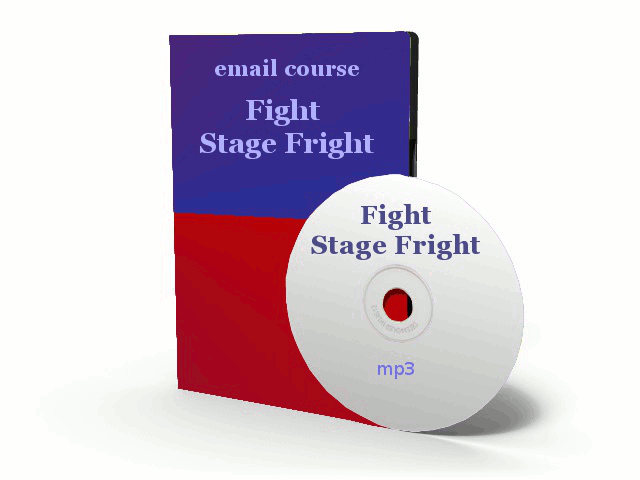
Is there a stage fright hypnosis as cure?
That would be very nice. Practicing stage performances and applying tips, as for example, deep breathing and trying to enjoy your show/presentation, can be time-consuming. There is no guarantee that they work. In fact, often they show only short and shallow results. You soon will be left with the question "How to get rid of stage fright?"
Hypnosis, on the other hand, is considered a very fast and effective cure for anxieties and phobias. So you might wonder, "Is there a hypnosis to treat my stage fear?"
Indeed, I have good news for you... But first, let's get into some background.
Hypnosis
Hypnosis is a mental state that is induced by a series of instructions usually given by a hypnotherapist.
The hypnotic state is characterized by an increased mental focus on one object, for example a pendulum, and a high responsiveness to suggestions.
Originally, the word hypnosis means nervous sleep [1]. However, in the current scientific opinion it is totally different from the sleep state.
While a sleeping person usually does not perceive and process stimuli from the outside world, a hypnotic subject, that is, a person who gets hypnotized, is consciously aware.
Of course, this awareness is restricted to a single item, and subjects are generally not fully attentive of all surrounding cues, as they are during usual activities.
During hypnosis, the focused attention is accompanied by a reduced ability to objectively judge situations. Being intensely immersed in something involves reduced thought and evaluation processes, and thus hypnotized subjects are highly responsive to suggestions.
This is used to change a subject's sensation, emotion perception or complete behavior. An example of application is the reduction of sensation of pain during dental operations. Or hypnosis against performance anxiety, as we will see here;-)
However, misuse of hypnosis are well known stage hypnotists who bring people to perform unreasonable or usually unwanted actions.

Suggestions
Generally, suggestions can be given via all sensual channels, that is visually, auditory etc. Most often verbal suggestions are used, where the hypnotists ask the subject to build mental imagery.
The effectiveness of suggestions can be increased by altering the voice tonality. A friendly, soft and melodic voice allows for a mental openness and quicker absorption.
Suggestions can be given directly as commands and requests, or indirectly as rhetorical questions, for example, "Now, don't you feel your stage nervousness has gone?"
Want to have a free self-hypnotic session against your fright?
Sign in for the Fight The Fright 6 day FREE email course
- a powerful self-hypnotic stage fear session
- PDF with another excellent stage fear training
- one self-hypnotic mp3
- 4 powerful anti-stage nervousness techniques
- lots of tips and knowledge...
Hypnotic induction
A frequently used technique for hypnotic induction is eye fixation. That is, the subject stares at an object, as e.g., a pendulum or the eyes of the hypnotist.
 At the same time, subjects are asked to relax and often to close their eyes at the end of induction. An important factor of an effective hypnosis induction is that the hypnotized person should cooperate and experience the procedure in a voluntary manner.
At the same time, subjects are asked to relax and often to close their eyes at the end of induction. An important factor of an effective hypnosis induction is that the hypnotized person should cooperate and experience the procedure in a voluntary manner.
Although people can be hypnotized without knowing it or even against their will, as during advertisement, those hypnotic states are not very deep and long lasting [2].
Use of hypnosis
The major use of hypnosis is in medicine and psychotherapy. There it found an increasing body of applications, from pain reduction, treatment of anxieties, depressions and many more.
Also, the usefulness of concomitant hypnotherapy for cancer treatment has been shown. Recently, hypnotherapy has been applied to improve nightmare disorders [3].
A great field of application is self-improvement and life-style. Quit smoking, stress reduction and weight loss are typical examples. And of course, there is a hypnosis against fear of public speaking.
Show hypnoses for entertaining are perhaps the best known utilization of hypnosis. Usually, subjects are brought to do things in front of an audience, that they would not do in other circumstances, for example, for reasons of shyness and absurdness.
Furthermore, hypnosis was used by artists for automatic writing, as artistic experiment or to improve creativity.

Hypnotherapy
The well-documented effectiveness of hypnotherapy has led to an ever-increasing field of application. In principal, hypnosis can be used in all cases where the psyche of a person plays an underlying role.
Hence, it is successfully applied to treat anxiety, sleep and eating disorders, depression, phobias and insomnia.
It has a clear effect in habit control (e.g. smoking, eating, compulsive behavior, alcohol abuse) as well as mental preparation for sports performance.
Hypnosis against stage fear
Hypnotherapy was shown to be effective in treating many forms of phobias and anxieties. Since stage anxiety is a relatively simple acquired social phobia, the chance of a successful treatment by means of stage apprehension hypnosis is quite high.
Similar to cognitive behavior-therapy, during hypnotic sessions the subject, being deeply relaxed, imagines himself/herself in situations that usually provoke stage anxiety.
 The relaxation causes the subject to feel nearly no fear. Now the hypnotherapist provides positive suggestions linked to the stage situation that are visualized as mental imagery.
The relaxation causes the subject to feel nearly no fear. Now the hypnotherapist provides positive suggestions linked to the stage situation that are visualized as mental imagery.
The openness of the mind allows the suggestions to firmly connect to the stage situation. The subject can get completely cured of fear of public speaking by this hypnosis.
This may only take a few hypnotic sessions. Disadvantages of hypnotherapy are its relatively high costs. A session starts at more or less $70, while at least three sessions plus initial consultations are needed.
Another disadvantage can be the laborious search for a hypnotherapist with free capacities. Also, not every therapist fits for each client. So several searches and consultations can be required.
Self-hypnosis for stage fear can be a cost effective alternative (see next section). A clear advantage of hypnosis is the high effectiveness and short amount of time needed for a complete cure.
Cognitive behavior-therapy or a comprehensive psycho-analysis can take months to show first results of reduced stage fear.
However, a deep analysis of the psyche is usually not necessary to tread stage anxiety, as opposed to rather complex disorders as traumas.
Self-hypnosis against stage fright
There are several flavors of self-hypnosis for stage nervousness. The most effective one is listening to an hypnotic audio session where a hypnotherapist speaks the induction and suggestions.
Usually, the audio is given to the patient for complementary usage at home. Sometimes, these audios are available as CDs in a bookstore (self-help and lifestyle shelves).
The benefit is, you buy them once and apply them as often as you want. Or simply, till you completely get over your performance anxiety for good.
On the downside, they are not as fast and effective as a therapist, who can watch you and give immediate feedback. His ability to adapt to your wishes and needs makes hypnotherapy a faster way to reach the goal.
An alternative to a CD is learning self-hypnosis yourself. It's a quite universal skill. When you have cured your stage apprehension, you can pick your next fear and cure that.
However, learning self-hypnosis is quite time consuming and needs patience and the ability to monitor yourself critically.
Downsides of hypnosis
There are many people who call themselves hypnotherapists and offer fast cures of virtually any disorder. Whereas the first skills to hypnotize people can be learned in few weeks of practice, this alone still doesn't constitute a good hypnotherapist.
A trustworthy one would never offer immediate help for cash or promise dreams to come true in short time. Professionals will always take the time to become acquainted to their clients and strictly set client's good health before doing business with him.
One will be asked for psychic conditions with which hypnotherapy must be avoided. An extreme are show-hypnotists that risk damages to subjects when letting them perform straining or dangerous stunts under hypnosis.
Professionals would not even provoke embarrassing action if their clients did not comply to it in advance. This can be the case when treating unwanted behavior. Of course, stage fear hypnosis will get one doing embarrassing things on stage;-) But this is only the own biased view. Others will look up to the performer and wonder "How confident he deals with his fright!".
Contraindications of hypnosis
Hypnosis must not be applied if the client has any contraindicatory psychotic conditions. These include mental disorder, paranoid state, delusion, schizophrenia, dementia, manic disorder and epilepsy.
Further physical contitions that must be excluded are brain injury, heart conditions and electro-convulsive therapy [4].
Tips to overcome your fright
Further tips to overcome stage apprehension
Stop your stage anxiety now!
